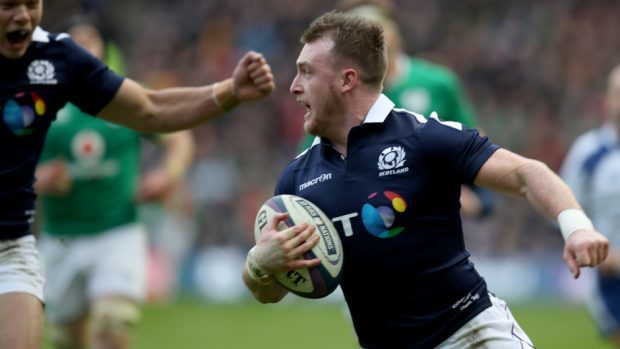There are two ways to respond to disappointment in sport. You can focus on the negative aspects and be dragged into an abyss of despair.
Or you can dust yourself down, pick yourself up, and resolve to make sure the experience never happens again.
Scotland’s rugby team chose the latter option when they kicked off their 2017 Six Nations Championship campaign with a heart-stopping, nerve-shredding 27-22 victory over Ireland at Murrayfield.
It was a classic tussle, which was markedly superior in quality to England’s spluttering 19-16 win over France at Twickenham, a contest which stubbornly refused to spring to life.
Even the ebullient RFU coach, Eddie Jones, described his team’s success as “ugly” – mind you, the sweet Charioteers have notched up 15 consecutive victories, so they remain favourites for the title.
And yet, given the dynamism and derring-do exhibited by the Scots, there really is no reason why they should be fearful about their impending challenges. The French are big, brutal, belligerent foes, and Louis Picamoles is a magnificent player, but Les Bleus are desperately short on creativity and inspiration.
By contrast, the Scots’ first-half showing against Ireland was one of the most pulsating displays in many a year. Fuelled by the ubiquitous Stuart Hogg, they were inexorable, tacked as if their lives depended on it, and flung themselves into the fray with a juddering intensity which, at least temporarily, bewitched and bewildered their opponents.
Hogg twice crossed the Irish line, Alex Dunbar followed suit and though Keith Earls replied for the visitors, they hardly knew what hit them. Some of the more optimistic fans at the midway stage oozed confidence; but most of us remained cautious.
Too often, the SRU’s finest have burst out of the starting blocks in recent seasons only to pull a hamstring in the last few metres.
Even with a 21-8 advantage, one sensed Vern Cotter’s team would be pushed every inch of the way in the second period. And so it proved. Indeed, their adversaries launched the sort of sustained blitzkrieg which demonstrated how they had managed to beat the All Blacks in Chicago last autumn.
The home supporters began to fret when Ian Henderson reduced the deficit to 21-15 with a try as his confreres streamed forward. And the same aficionados who had belted out “Flower of Scotland” with unrestrained delight looked shellshocked when Paddy Jackson’s touchdown put Ireland in front for the first time after 62 minutes. But, if this was a time for heroes, they duly emerged in the final quarter.
Time after time, the ferocity of the Scottish resistance made one gasp. Their talismanic Richie Gray is no young ingenu any more, but a hardened campaigner. He alone made over 30 tackles and must have been covered in bruises by the denouement. And, elsewhere, his captain, Greig Laidlaw, mixed pragmatism with panache and tough-as-teak professionalism.
In the closing stages, with the result always in doubt, it would have been easy for the Borderer to grow apprehensive. After all, he has had to endure some sickening last-gasp reverses, including the infamous defeat to Australia in the World Cup.
Yet, undaunted, Laidlaw and his fellow Bravehearts maintained their composure and the skipper’s kicking ensured there was no further heartache as he landed a vital brace of penalties. He and the blue wall stood up to repeated attacks in the closing stages and there was a tenacity and resilience about their exertions which reinforced my pre-tournament prediction that Scotland can challenge for the title.
Nobody, least of all Cotter, will be getting carried away. But this was the first time since 2006 that the side had triumphed in their opening fixture. It’s Paris next weekend and there seems no reason, if they can maintain this early momentum, why they can’t test France’s mettle.
As for the rest, we didn’t discover much we didn’t already know. England are formidably efficient, Ireland will be better for the return of Jonathan Sexton, and the French will rely on muscular machismo.
Wales, for their part, enjoyed 78% of possession in the first half in Rome and scored three points! Italy, meanwhile are still reliant on the indomitable exertions of the mighty Sergio Parisse, but, as Picamoles proved, there is only so much any one man can do in rugby!
And although the Welsh benefited from a late sin-binning to ease to a comfortable 33-7 success, that scoreline was massively flattering to the visitors. We’ll learn more about their threat after they take on England next Saturday.
Ultimately, Scotland have emerged from the opening weekend with greater credit than anybody else!
So far, so very promising.
